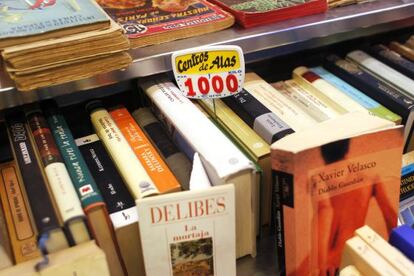Half a kilo of literature, please
A group of friends has opened up a bookshop that prices second-hand books according to their weight

Tropic of Cancer, by Henry Miller. Paperback, 275 grams: 2.75 euros. El Siglo de las luces, by Alejo Carpentier. Hardbound, 500 grams: five euros. Raquel Olózaga weighs out books on a digital scale. She has a traditional scale in the back of the stall, but it isn't as precise.
Raquel has always been around market stalls, and she's at home here. Her grandfather was a butcher, and sold offal and tripe. In her new job, she is in a stall once more. She and five friends have opened a second-hand bookshop that bears the name of her grandfather's former stall, La Casquería, in the renovated San Fernando market in Lavapiés. The only shop where books are sold by weight, at 10 euros a kilo. You pay for the material, not the content.
The space has been united with what was once a poultry stall, and has been completely refurbished. But the shop is not what the friends originally had in mind. "We liked the idea of a shop like those you see in Cairo, where you rummage through disordered piles of books," says Raquel from among the boxes. But the idea was abandoned, and they opted for a modicum of order.
"We decided that although this wasn't a good time to open an ordinary bookshop, it might be right for something alternative. We looked around, and saw that in Spain there was nothing like this in sight," explains Raquel. According to the Publishers' Guild, Madrid is the region of Spain with the highest ratio of readers among the population, at 70.2 percent.
What doesn't interest one reader may excite another. It's up to them to evaluate the content"
The hardest part was finding a place. "Rents are astronomical. The plan was on standby for six months. And then we found this," she says.
After some thought the group - made up of two teachers, a journalist, a biologist, a political scientist and a leather craftsman - took the plunge at a time when the San Fernando market, open since the 1940s, is making a comeback. Its chronic decline - most such neighborhood markets have long been losing business to supermarkets and shopping malls - had caused many stallholders to give up and sell out, but those who remain welcome new proposals that bring people to the market.
The Casquería project is built on two concepts: cheap access to culture, and the promotion of recycling. They were clear that they didn't want to value books on sales percentages, but on their materials: ink, paper and binding. "What doesn't interest one reader may excite another. It's up to them to evaluate the content."
Here the Stephanie Meyers vampire bestseller New Moon shares a shelf with Dostoyevsky's Crime and Punishment. "We don't want to have just old books, but anything second-hand," she explains. They talk to the staff in big chain bookshops. "These people know what books are selling." The internet, personal contacts, word of mouth and donations are other factors. While they all like reading, they also want to help the recovery of the market. "These markets used to be centers of neighborhood life, and now they are being strangled to near extinction," they write on their web page.
The shop's launch party in April was a success. They offered wine and boiled tongue, "in honor of the old Casquería." Since then the trickle of customers has been constant. And the market's life is looking brighter.
Tu suscripción se está usando en otro dispositivo
¿Quieres añadir otro usuario a tu suscripción?
Si continúas leyendo en este dispositivo, no se podrá leer en el otro.
FlechaTu suscripción se está usando en otro dispositivo y solo puedes acceder a EL PAÍS desde un dispositivo a la vez.
Si quieres compartir tu cuenta, cambia tu suscripción a la modalidad Premium, así podrás añadir otro usuario. Cada uno accederá con su propia cuenta de email, lo que os permitirá personalizar vuestra experiencia en EL PAÍS.
¿Tienes una suscripción de empresa? Accede aquí para contratar más cuentas.
En el caso de no saber quién está usando tu cuenta, te recomendamos cambiar tu contraseña aquí.
Si decides continuar compartiendo tu cuenta, este mensaje se mostrará en tu dispositivo y en el de la otra persona que está usando tu cuenta de forma indefinida, afectando a tu experiencia de lectura. Puedes consultar aquí los términos y condiciones de la suscripción digital.








































